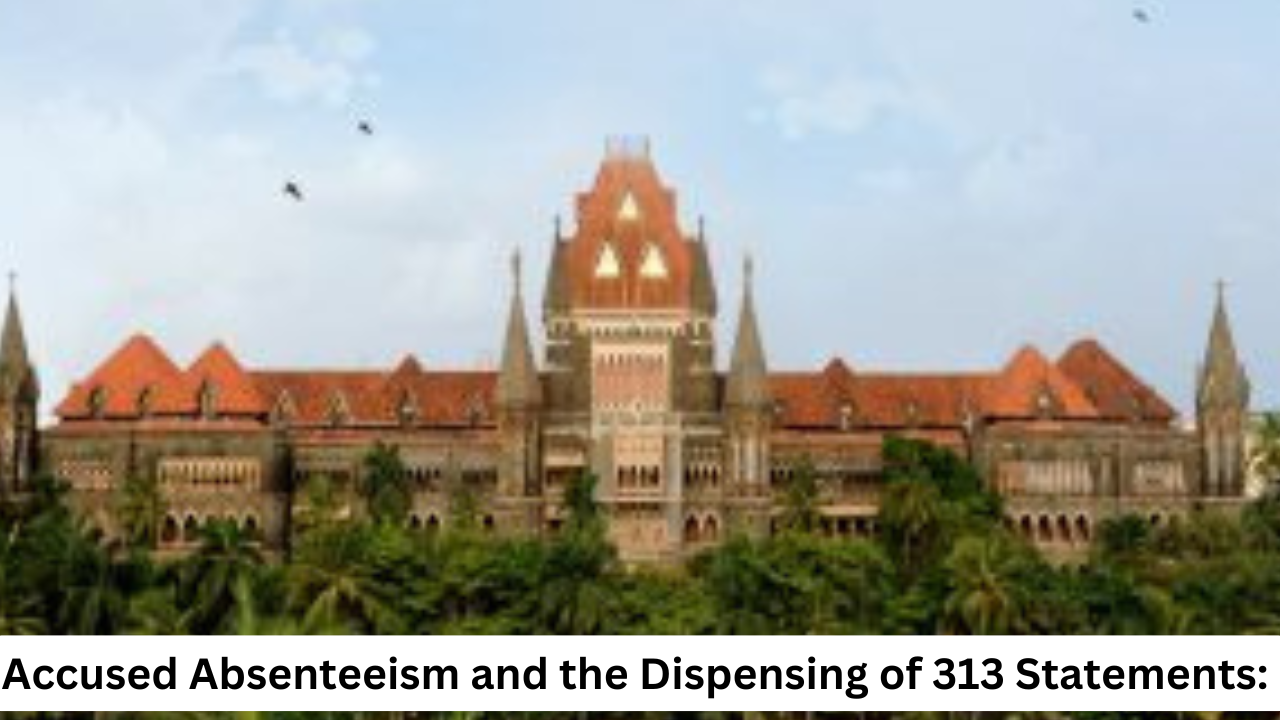By Adv. Mira Deshmukh
Introduction
This case study analyzes the Bombay High Court’s recent judgment in Navneet Singh Gogia Vs. State of Maharashtra, which addressed the contentious issue of dispensing with the accused’s statement under Section 313 of the Criminal Procedure Code (CrPC) in cases of accused absenteeism under Section 138 of the Negotiable Instruments Act, 1881.
Case Background
The case arose from two summary cases filed against Navneet Singh Gogia and Simran Kaur Gogia, directors of a company, for issuing two dishonored cheques amounting to Rs. 1 crore. Despite initial appearances, the accused consistently absented themselves from court proceedings.
Trial Court Proceedings
The trial court, despite the accused’s absence, proceeded with the trial and convicted them under Section 138 of the Act. The court dispensed with recording the accused’s statement under Section 313 of the CrPC, citing their continued absence.
Appeal and Revision
The accused challenged the conviction in appellate and revision proceedings, arguing that their absence did not justify dispensing with their right to be heard under Section 313.
Key Issue
The central issue before the High Court was whether the trial court was justified in dispensing with the accused’s statement under Section 313 in the face of their persistent absence, without adequately considering their right to a fair trial.
Legal Framework
The judgment delved into various provisions of the CrPC, including those related to the presence of the accused, the recording of evidence, and the principles of natural justice. It also examined relevant provisions of the Negotiable Instruments Act, particularly those concerning speedy disposal of cases.
Judicial Precedents
- The judgment extensively reviewed relevant Supreme Court and High Court judgments, including:
- Indian Bank Association v. Union of India: Emphasized the need for speedy disposal of Section 138 cases.
- TGN Kumar v. State of Kerala: Reinforced the mandatory nature of Section 313 questioning.
- Keya Mukherjee v. Magma Leasing Ltd.: Acknowledged the possibility of dispensing with personal appearance while allowing for alternative means of questioning under Section 313.
- Basavaraj R. Patil v. State of Karnataka: Outlined conditions for dispensing with personal appearance and recording statements through alternative means.
- P. Mohanraj v. Shah Brothers ISPAT Pvt. Ltd.: Characterized Section 138 proceedings as “quasi-criminal” in nature, emphasizing their compensatory and restitutive aspects.
- Findings and Conclusion
- The court held that in cases where the accused is deliberately absent and does not seek dispensation of their personal attendance or is not represented by an advocate, the trial court is justified in proceeding without recording a statement under Section 313 CrPC.
- The court also noted that such power should be exercised after considering factors such as the number of times the accused has been absent, steps taken to secure their presence and whether all legal modes were exhausted.
- The court emphasized that the view was not aligned with the traditional view of mandatory recording of the statement under section 313.
- It was opined that the appellate court could also question the accused if there were any deficiencies in recording the statement under Section 313.
- The court considered the quasi-criminal nature of prosecutions under Section 138 of the Negotiable Instruments Act, referencing P. Mohanraj and others Vs. Shah Brothers ISPAT Private Limited.
- The Supreme Court in P. Mohanraj case described a Section 138 proceeding as a “civil sheep” in a “criminal wolf’s” clothing, as it prioritises the interest of the victim, where the larger interest of the State was subsumed in the victim.
- The judgment referred to various earlier judgments of the Supreme Court, such as Goaplast (P) Limited Vs. Chico Ursula D’souza, Vinay Devanna Nayak V/s Ryot Sewa Sahakari Bank Limited, Damodar S. Prabhu V/s. Sayed Babalal H., R. Vijayan Vs. Baby, and Lafarge Aggregates and Concrete (India) (P) Ltd. Vs. Sukarsh Azad, which also highlighted the quasi-criminal nature of Section 138 proceedings.
- The judgment noted, a conspectus of these judgements would show that the gravamen of a proceeding under Section 138, though couched in language making the act complained of an offence, is really in order to get back through a summary proceeding, the amount contained in the dishonoured cheque together with interest and costs, expeditiously and cheaply.
- The court held that given the quasi-criminal nature of Section 138 proceedings, the mandatory recording of a statement under Section 313 of the CrPC may not be applicable.
- The court upheld the trial magistrate’s and the appellate court’s findings and dismissed the revision applications, confirming the conviction and sentence.
- The amount deposited in court was to be paid to the complainant.
- The judgment emphasizes that in cases under Section 138 of the Negotiable Instruments Act, if the accused remains consistently absent and does not cooperate with court procedure, they cannot claim prejudice due to the non-recording of their statement under Section 313 of the CrPC.
Positive Aspects of the Judgment:
- Addresses the issue of protracted trials: The judgment attempts to address the practical problem of delays caused by the accused’s deliberate absence.
- Promotes efficiency in cheque bouncing cases: It streamlines the process, potentially reducing the backlog of such cases.
- Acknowledges inherent powers of the court: It recognizes the court’s inherent powers to manage proceedings and ensure justice.
Critical Analysis:
- Potential conflict with Section 313 CrPC and fair trial rights: Dispensing with 313 statements, a crucial safeguard, raises concerns about the right to a fair trial and due process.
- Vagueness of guiding factors: The factors listed for magistrates to consider are subjective and lack clarity, potentially leading to inconsistent application.
- Inadequate discussion of prejudice: The judgment doesn’t adequately address how the accused is prejudiced by not being able to explain the evidence against them.
- Overemphasis on the quasi-criminal nature: The reliance on the quasi-criminal nature of the proceedings downplays the potential impact of criminal sanctions on the accused.
- Potential for misuse: The judgment creates a loophole that complainants could exploit, potentially leading to unfair convictions.
Conclusion:
While aiming for efficiency, the judgment raises serious concerns about procedural fairness and the protection of fundamental rights. The creation of a de facto exception to the mandatory provisions of Section 313 CrPC, without explicit legislative backing, is problematic. The judgment’s vagueness regarding the conditions under which this exception applies creates uncertainty and opens the door to inconsistent and potentially unfair outcomes.
Further Suggestions:
- Legislative clarification: The legislature should clarify the scope of Section 313 and address the circumstances under which dispensing with 313 statements is permissible.
- Clear guidelines: Specific, objective guidelines are needed to ensure consistent and fair application of the principles outlined in this judgment.
- Emphasis on securing attendance: Courts should prioritize exploring all available means to secure the accused’s attendance before resorting to ex-parte proceedings.
- Consideration of alternative approaches: Alternatives, such as video conferencing or written explanations from the accused, could be explored to balance efficiency and fairness.
- Stricter consequences for unjustified absence: Implementing stricter measures for unjustified absences could deter strategic avoidance of proceedings.
- By addressing these issues, the legal framework can be strengthened to better balance the competing interests of efficiency and the protection of fundamental rights, ensuring a just and equitable outcome for all parties involved in cheque bouncing cases.
Read original Judgement;
![]()









